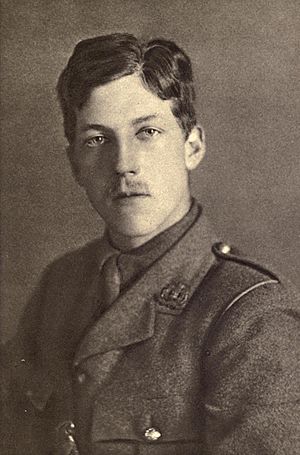Charles Sorley facts for kids
Quick facts for kids
Charles Sorley
|
|
|---|---|
 |
|
| Born | Charles Hamilton Sorley 19 May 1895 Aberdeen, Scotland |
| Died | 13 October 1915 (aged 20) Hulluch, Lens, France |
| Cause of death | Killed in action |
| Occupation | Soldier, Poet, Student |
| Nationality | British |
| Alma mater | Marlborough College |
| Period | Early 20th century |
| Genre | Poetry |
| Notable works | Marlborough and Other Poems |
| Military career | |
| Allegiance | |
| Service/ |
|
| Years of service | 1914–1915 |
| Rank | Captain |
| Unit | Suffolk Regiment |
| Battles/wars | First World War |
Charles Hamilton Sorley (born May 19, 1895 – died October 13, 1915) was a British Army officer and a Scottish war poet. He fought in the First World War and sadly died in battle. He is remembered for his powerful poems about the war.
Contents
Life of a Young Poet and Soldier
Charles Hamilton Sorley was born in Aberdeen, Scotland. His father, William Ritchie Sorley, was a university professor and philosopher. Charles went to school at King's College School, Cambridge, and later at Marlborough College from 1908 to 1913.
At Marlborough College, Charles loved cross-country running, especially in the rain. This love for running and nature appeared in many of his early poems, like Rain and The Song of the Ungirt Runners. He was known for having strong beliefs about right and wrong.
Time in Germany
Before going to University College, Oxford, Charles spent about six months in Germany in 1914. He studied the German language and culture in Schwerin. Then, he went to the University of Jena.
However, his studies were cut short when World War I began. Germany declared war on Russia, and Charles was briefly held in Trier. He was soon released and told to leave the country.
Joining the War
Charles returned to England right away and volunteered to join the British Army. He became a second lieutenant in the Suffolk Regiment. He was part of a new unit called Kitchener's Army, formed to fight in the war.
He arrived on the Western Front in Boulogne, France, on May 30, 1915. He served near a place called Ploegsteert. In August 1915, he was promoted to Captain.
His Final Battle
Charles Sorley was killed in action on October 13, 1915. He was shot in the head by a sniper during the Battle of Loos near Hulluch, France. He has no known grave. His name is remembered on the CWGC Loos Memorial.
His very last poem, When You See Millions of the Mouthless Dead, was found in his belongings after he died. It contains some of his most famous lines:
- When you see millions of the mouthless dead
- Across your dreams in pale battalions go
His Lasting Legacy
After his death, Charles Sorley's book of poems, Marlborough and Other Poems, was published in January 1916. It was an instant success, with six editions printed that same year. His parents also published his collected letters in 1919.
Influence on Other Poets
Robert Graves, another famous poet who fought in the war, called Sorley one of the three most important poets killed during the war. The other two were Isaac Rosenberg and Wilfred Owen. Many people see Sorley as someone who influenced later war poets like Siegfried Sassoon and Wilfred Owen. His writing style was very direct and honest, unlike some other poets of his time.
Music and Commemoration
In 1919, a composer named Charles Wood set the last two stanzas of Sorley's poem Expectans expectavi to music. This song is still performed in many churches today.
Some people, including the famous poet John Masefield, believe that losing Charles Sorley was one of the greatest losses among all the poets who died in the war.
On November 11, 1985, Charles Sorley was honored at Westminster Abbey's Poet's Corner. A special stone was unveiled there, remembering 16 Great War poets. The words on the stone were written by Wilfred Owen: "My subject is War, and the pity of War. The Poetry is in the pity."
Plays and Recognition
A play about his life, called It Is Easy To Be Dead, was created by Neil McPherson. It was based on Sorley's poems and letters. The play was shown in London in 2016 and was even nominated for an Olivier Award.
In 2018, an article in The Wall Street Journal by Aaron Schnoor praised the poetry of World War I, including Sorley's poem "When You See Millions of the Mouthless Dead."
His Published Works
- Marlborough and Other Poems. Cambridge University Press, 1916.
- Wilson, Jean Moorcroft (Ed). The Collected Poems of Charles Hamilton Sorley. London: Cecil Woolf, 1985. ISBN: 0-900821-53-1.
- Wilson, Jean Moorcroft (Ed). The Collected Letters of Charles Hamilton Sorley. London: Cecil Woolf, 1990.
- Spear, Hilda D. (Ed). The Poems and Selected Letters of Charles Hamilton Sorley. Dundee: Blackness Press, 1978.
 | Jessica Watkins |
 | Robert Henry Lawrence Jr. |
 | Mae Jemison |
 | Sian Proctor |
 | Guion Bluford |

